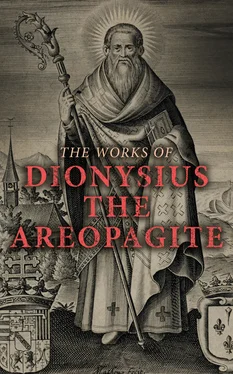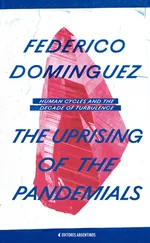SECTION VII.
Now we have set forth in the Theological Outlines whatever Divine Causes we have found in the Oracles, of these unions, and distinctions, by treating each separately, according to our ability; by explaining some things, by the infallible Word, and unfolding them; and by conducting the religious and unpolluted mind to the bright visions of the Oracles; but others, as being full of mystery, by approaching them according to the Divine tradition, which is superior to mental energy. For all the Divine properties, even those revealed to us, are known by the participations alone; and themselves, such as they are in their own source and abode, are above mind and all essence and knowledge. For instance, if we have named the superessential Hiddenness, God, or Life, or Essence, or Light, or Word (λόγος), we have no other thought than that the powers brought to us from It are deifying, or essentiating, or life-bearing, or wisdom-imparting; but to Itself we approach during the cessation of all the intellectual energies, seeing no deification, or life, or essence whatever, such as is strictly like the Cause pre-eminently elevated above all. Again, that the Father is fontal Deity, but the Lord Jesus and the Spirit are, if one may so speak, God-planted shoots, and as it were Flowers and superessential Lights of the God-bearing Deity, we have received from the holy Oracles; but how these things are, it is neither possible to say, nor to conceive.
SECTION VIII.
But. up to this point, our utmost power of mental energy carries us, namely, that all divine paternity and sonship have been bequeathed from the Source of paternity and Source of sonship—pre-eminent above all—both to us and to the supercelestial powers, from which the godlike become both gods, and sons of gods, and fathers of gods, and are named Minds, such a paternity and sonship being of course accomplished spiritually, i.e. incorporeally, immaterially, intellectually,— since the supremely Divine Spirit is seated above all intellectual immateriality, and deification, and the Father and the Son are pre-eminently elevated above all divine paternity and sonship. For there is no strict likeness, between the caused and the causes. The caused indeed possess the accepted likenesses of the causes, but the causes themselves are elevated and established above the caused, according to the ratio of their proper origin. And, to use illustrations suitable to ourselves, pleasures and pains are said to be productive of pleasure and pain, but these themselves feel neither pleasure nor pain. And fire, whilst heating and burning, is not said to be burnt and heated. And, if any one should say that the self-existent Life lives, or that the self-existent Light is enlightened, in my view he will not speak correctly, unless, perhaps, he should say this after another fashion, that the properties of the caused are abundantly and essentially pre-existent in the causes.
SECTION IX.
Further also, the most conspicuous fact of all theology—the God-formation of Jesus amongst us—is both unutterable by every expression and unknown to every mind, even to the very foremost of the most reverend angels. The fact indeed that. He took substance as man, we have received as a mystery, but we do not know in what manner, from virginal bloods, by a different law, beyond nature, He was formed, and how, with dry feet, having a bodily bulk and weight of matter, He marched upon the liquid and unstable substance 28; and so, with regard to all the other features of the super-physical physiology of Jesus. Now, we have elsewhere sufficiently spoken of these things, and they have been celebrated by our illustrious leader, in his Theological Elements, in a manner far beyond natural ability—things which that illustrious man acquired, either from the sacred theologians, or comprehended from the scientific, search of the Oracles, from manifold struggles and investigations respecting the same, or was instructed from a sort of more Divine Inspiration, not only having learnt, but having felt the pangs of things Divine, and from his sympathy with them, if I may so speak, having been perfected to their untaught and mystic union and acceptance. And that we may display, in fewest words, the many and blessed visions of his most excellent intelligence, the following are the things he says, concerning the Lord Jesus, in the Theological Elements compiled by him.
SECTION X.
From the Theological Elements of the most holy Hierotheus.
Deity of the Lord Jesus,— the Cause and Completing of all, which preserves the parts concordant with the whole, and is neither part nor whole, and whole and part, as embracing in Itself everything both part and whole, and being above and before—is perfect indeed in the imperfect, as source of perfection, but imperfect in the perfect, as super-perfect, and pre-perfect—Form producing form, in things without form, as Source of form—formless in the forms, as above form,—Essence, penetrating without stain the essences throughout, and superessential, exalted above every essence—setting bounds to the whole principalities and orders, and established above every principality and order. It is measure also of things existing, and age, and above age, and before age—full, in things that need, super-full in things full, unutterable, unspeakable, above mind, above life, above essence. It has the supernatural, supernaturally,—the superessential, superessentially. Hence, since through love towards man, He has come even to nature, and really became substantial, and the Super-God lived as Man 29(may He be merciful with regard to the things we are celebrating, which are beyond mind and expression), and in these He has the supernatural and super-substantial, not only in so far as He communicated with us without alteration and without confusion, suffering no loss as regards His super-fulness, from His unutterable emptying of Himself—but also, because the newest of all new things, He was in our physical condition super-physical—in things substantial, super-substantial, excelling all the things—of us—from us—above us.
SECTION XI.
This then is sufficient on these matters, let us now advance to the purpose of the discourse by unfolding, to the best of our ability, the kindred and common Names of the Divine distinction. And, in order that we may first distinctly define everything, in order, we call Divine distinction, as we have said, the goodly progressions of the Godhead. For, by being given to all things existing, and pouring forth the whole imparted goods in abundance, It is distinguished uniformly, and multiplied uniquely, and is moulded into many from the One, whilst being self-centred. For example, since Almighty God is superessentially Being, but the Being is bequeathed to things being, and produces the whole Essences; that One Being is said to be fashioned in many forms, by the production from Itself of the many beings, whilst It remains undiminished, and One in the multiplicity, and Unified during the progression, and complete in the distinction, both by being superessentially exalted above all beings, and by the unique production of the whole; and by the un-lessened stream of His undiminished distributions. Further, being One, and having distributed the One, both to every part and whole, both to one and to multitude, He is One, as it were, superessentially, being neither a part of the multitude, nor whole from parts; and thus is neither one, nor partakes of one, nor has the one. But, beyond these, He is One, above the one, to things existing—One, and multitude indivisible, unfilled super-fulness, producing and perfecting and sustaining every one thing and multitude. Again, by the Deification from Itself, by the Divine likeness of many who become gods, according to their several capacity, there seems, and is said to be, a distinction and multiplication of the One God, but. He is none the less the Supreme God, and super-God, superessentially One God,—undivided in things divided, unified in Himself, both unmingled and unmultiplied in the many. And when the common conductor of ourselves, and of our leader to the Divine gift of light,—he, who is great in Divine mysteries—the light of the world—had thought out this in a manner above natural ability,—he speaks as follows, from the inspiration of God, in his sacred writings—“For, even if there are who are called gods, whether in heaven or upon earth, as there are gods many and lords many; but to us there is One God, the Father, from Whom are all things, and we unto Him,—and One Lord Jesus Christ, through Whom are all things, and we, through Him 30.” For, with regard to things Divine, the unions overrule the distinctions, and precede them, and are none the less unified, even after the self-centred and unified distinction. These, the mutual and common distinctions, or rather the goodly progressions of the whole Deity, we will endeavour to the best of our ability to celebrate from the Names of God, which make them known in the Oracles;—first, having laid down, as we have said, that every beneficent Name of God, to whichever of the supremely Divine Persons it may be applied, is to be understood with reference to the whole Supremely Divine wholeness unreservedly.
Читать дальше












